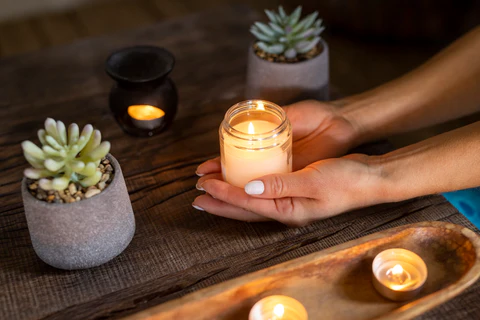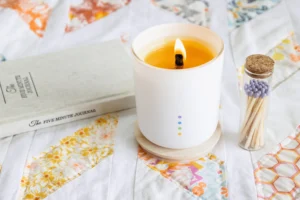Meditation has long been a cherished practice for cultivating inner peace and mental clarity. As people seek ways to enhance their meditation experience, scented candles have emerged as a popular tool. The gentle flicker of a candle combined with the soothing scent of essential oils can create a serene environment conducive to deep meditation. This article explores the benefits of using scented candles in meditation, the various scents available, how to choose the right candle, and ways to incorporate them into your practice.
The Benefits of Using Scented Candles in Meditation

Enhancing Focus and Concentration
Meditation requires a calm and focused mind, and certain scents can significantly aid in achieving this state. Aromas like peppermint and rosemary are known for their ability to enhance cognitive function and improve concentration. When used during meditation, these scents can help clear mental fog, making it easier to focus on your breath or mantra. This heightened concentration allows for a deeper and more fulfilling meditation experience.
Creating a Calming Atmosphere
One of the primary benefits of scented candles is their ability to create a tranquil environment. Scents such as lavender and chamomile are renowned for their calming properties. The subtle aroma of these essential oils can reduce stress and anxiety, helping you to relax more fully during meditation. By promoting relaxation, these scents enable you to enter a meditative state more quickly and maintain it for longer periods.
Stimulating the Senses
The sense of smell is powerful and deeply connected to our emotions and memories. By engaging your sense of smell with scented candles, you can enhance the overall sensory experience of meditation. Scents can evoke positive memories and emotions, which can deepen your meditative state and make the practice more enjoyable. This multisensory approach can transform meditation from a purely mental exercise into a holistic experience.
Aromatherapy Benefits
Aromatherapy, the use of essential oils for therapeutic purposes, has numerous benefits for both mental and physical health. When combined with meditation, aromatherapy can enhance the practice by promoting relaxation, reducing stress, and improving overall well-being. The synergy between aromatherapy and meditation can lead to a more profound sense of peace and tranquility.
Popular Scents for Meditation and Their Effects
Lavender
Lavender is one of the most popular scents for meditation due to its relaxing and stress-relieving properties. Its gentle, floral aroma helps to calm the mind and body, making it an ideal choice for evening meditations aimed at unwinding after a long day. Lavender’s ability to reduce anxiety and promote a sense of peace makes it a staple in any meditation toolkit.
Sandalwood
Sandalwood has a rich, woody scent that is often associated with spiritual practices. It is known for its grounding properties, making it an excellent choice for meditations focused on deepening spiritual connections and grounding oneself. Sandalwood can help create a sacred space for meditation, fostering a sense of inner peace and spiritual awareness.
Frankincense
Frankincense has been used in religious and spiritual rituals for centuries. Its purifying and spiritually uplifting properties make it a powerful aid in meditation. The scent of frankincense can help cleanse the mind and create a sense of sacredness, enhancing spiritual connection during meditation. It is particularly useful for meditations that involve prayer or spiritual contemplation.
Peppermint
Peppermint has an invigorating and refreshing scent that can help to clear the mind and enhance focus. It is ideal for morning meditations or sessions where mental clarity and alertness are desired. Peppermint’s stimulating properties can help you stay awake and attentive, making it easier to maintain focus throughout your meditation practice.
Citrus Scents (Lemon, Orange)
Citrus scents such as lemon and orange are uplifting and can boost mood and energy levels. These scents are perfect for meditations aimed at increasing positivity and vitality. The bright and cheerful aromas of citrus fruits can help lift your spirits and promote a sense of joy and well-being, making your meditation practice more energizing and enjoyable.
Eucalyptus
Eucalyptus has a clean, refreshing scent that is often used to support respiratory health. It is excellent for meditations that focus on breathwork and clearing the mind. The invigorating aroma of eucalyptus can help open up the airways, making breathing exercises more effective and enhancing the overall meditation experience.
Choosing the Right Scented Candle for Meditation
Personal Preferences
Choosing the right scented candle for meditation is highly personal. What works for one person may not work for another, as individual responses to scents can vary greatly. It is important to experiment with different scents to find the ones that resonate most with you. Pay attention to how each scent makes you feel and select those that enhance your meditation practice the most.
Quality of Candles
When selecting scented candles, quality is key. Look for candles made with natural ingredients and essential oils, as these are less likely to contain harmful chemicals. Avoid candles with synthetic fragrances, which can be overpowering and potentially harmful. High-quality candles made from natural waxes, such as soy or beeswax, provide a cleaner burn and are better for both your health and the environment.
Candle Types
There are several types of candles to choose from, each with its own pros and cons. Soy candles are a popular choice due to their clean burn and eco-friendliness. Beeswax candles are also a great option, known for their long burn time and natural honey scent. Paraffin candles are less expensive but can release harmful chemicals when burned. For health-conscious and environmentally friendly options, soy and beeswax candles are recommended.
Size and Burn Time
The size of the candle and its burn time are important considerations, especially if you meditate for long periods. Smaller candles with shorter burn times may be suitable for quick meditation sessions, while larger candles with longer burn times are ideal for extended practices. Consider your meditation routine and choose a candle size that fits your needs. Long-burning candles are practical and ensure that you do not run out of your favorite scent mid-session.
Incorporating Scented Candles into Your Meditation Practice
Setting Up Your Meditation Space
Creating an ideal meditation environment is crucial for a successful practice. Scented candles can play a significant role in setting up this space. Choose a quiet, clutter-free area where you will not be disturbed. Place your candle in a safe, stable holder, and ensure it is positioned in a way that allows the scent to diffuse throughout the space without being too overpowering. The gentle glow of the candlelight can also add to the ambiance, creating a serene and inviting atmosphere.
Timing and Candle Placement
Timing and placement of your candle are important for maximizing its benefits. Light the candle a few minutes before you begin your meditation to allow the scent to permeate the room. Place the candle at a safe distance from where you will be sitting to avoid any accidents or distractions. Ensure that it is in a position where you can safely reach it to extinguish it after your session.
Combining Scents with Meditation Techniques
Different meditation techniques can be enhanced with specific scents. For mindfulness meditation, a calming scent like lavender can help you relax and stay present. For visualization exercises, a scent that evokes positive memories or emotions, such as citrus, can enhance the experience. Experiment with pairing different scents with various meditation techniques to find combinations that work best for you.
Mindful Breathing with Scented Candles
Incorporating scent into your breathing exercises can deepen your meditation practice. As you breathe in, focus on the aroma of the candle, allowing it to anchor your attention and bring you into the present moment. This can help you achieve a deeper state of relaxation and mindfulness. The scent acts as a focal point, guiding your breath and helping to quiet the mind.
Guided Meditations with Scented Candles
Guided meditations that incorporate scent prompts can enhance the sensory experience of meditation. Look for guided meditation recordings that suggest inhaling deeply to enjoy the scent of your candle at specific points. Synchronizing the guide with the aroma of the candle can create a more immersive experience, helping you to stay focused and engaged throughout the session.
Safety Considerations
Fire Safety
When using candles during meditation, fire safety is paramount. Always place your candle on a stable, heat-resistant surface away from flammable materials. Never leave a burning candle unattended, and always extinguish it before leaving the room. Consider using a candle snuffer to safely extinguish the flame and avoid splashing hot wax.
Allergies and Sensitivities
Be mindful of any allergies or sensitivities to certain scents. Some individuals may experience headaches, respiratory issues, or skin irritation from certain essential oils. If you have any known sensitivities, choose candles made with hypoallergenic ingredients or opt for an essential oil diffuser as an alternative.
Proper Ventilation
Proper ventilation is important to avoid overwhelming the senses with strong scents or smoke. Ensure that your meditation space has adequate airflow to keep the environment comfortable. This can be achieved by opening a window or using an air purifier. Balancing the intensity of the scent with a well-ventilated space can enhance the overall experience without causing discomfort.
Conclusion
Recap of Benefits
Incorporating scented candles into your meditation practice offers numerous benefits, including enhanced focus and concentration, a calming atmosphere, and the stimulation of the senses. The aromatherapy benefits of scented candles can also improve mental and physical well-being, making meditation a more enriching experience.
Encouragement to Experiment
Finding the right scented candles for your meditation practice is a personal journey. Experiment with different scents and combinations to discover what resonates most with you. Pay attention to how each scent affects your mood and meditation experience, and be open to trying new scents to keep your practice fresh and engaging.
Final Thoughts
Combining the ancient practices of aromatherapy and meditation can lead to profound improvements in your overall well-being. By creating a serene environment with scented candles, you can deepen your meditation practice and cultivate a greater sense of peace and tranquility.




